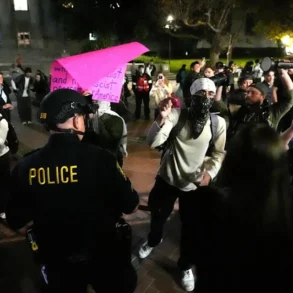SACRAMENTO, Calif. — Just one day after California voters overwhelmingly approved Proposition 50, a ballot measure that paves the way for a new U.S. House map designed to boost Democratic seats, Republicans filed a federal lawsuit on Wednesday to halt its implementation. The suit alleges that the redistricting plan unconstitutionally prioritizes race to favor Hispanic voters, violating key amendments to the U.S. Constitution.
The lawsuit, filed in the U.S. District Court for the Central District of California, names State Assemblyman David Tangipa as the lead plaintiff, alongside 18 other California voters and the California Republican Party. It was brought by the Dhillon Law Group, a firm founded by Harmeet Dhillon, who currently serves as an assistant attorney general for civil rights in the U.S. Department of Justice.
At a press conference in Sacramento, attorney Mike Columbo explained the core argument: “The map is designed to favor one race of California voters over others.” He claimed this breaches the 14th Amendment’s guarantee of equal protection under the law and the 15th Amendment’s protection against vote abridgement based on race. Columbo argued that while the Supreme Court permits race to be considered in redistricting to help minority groups elect preferred candidates, California’s plan doesn’t qualify. Hispanics, he noted, are the state’s largest ethnic group and have already achieved strong success in electing their choices.
Proposition 50, which passed decisively on Tuesday, temporarily shifts redistricting power from the state’s independent Citizens Redistricting Commission back to the Democrat-controlled legislature. Supporters, including Governor Gavin Newsom, say it could help Democrats flip up to five congressional seats in the 2026 midterms. The move is widely seen as a Democratic counterpunch to Republican-led gerrymandering in states like Texas, where new maps have created additional safe GOP districts at the urging of President Donald Trump to solidify Republican control of the House during his second term.
An analysis by the Public Policy Institute of California indicates that the new boundaries would maintain roughly the same level of racial representation, with no change in the number of majority-Latino districts compared to the current independent commission’s maps.
Republicans are urgently seeking a temporary restraining order to block the maps before December 19, when candidates can begin collecting signatures to qualify for the ballot—a key early step in the 2026 election process. Columbo expressed hope for a quick ruling in the coming weeks. Such cases are typically heard by a three-judge panel.
The Newsom administration dismissed the challenge with confidence and sarcasm. In a social media post, the governor’s office stated it hadn’t yet reviewed the lawsuit but predicted failure, adding, “Good luck, losers.” The post also shared a video mocking a technical glitch at the Republicans’ press conference where microphones fell over.
This legal battle unfolds against a broader national backdrop of redistricting fights. Last month, the Supreme Court heard arguments in a major Voting Rights Act case, where the conservative majority signaled potential limits on using race in drawing districts. California’s action marks the most aggressive Democratic response yet in this mid-decade redistricting war spreading across states.
As both parties vie for House control, the outcome of this lawsuit could reshape congressional power in one of the nation’s most populous states—and influence similar battles nationwide.







